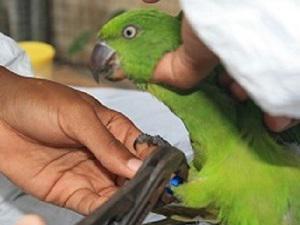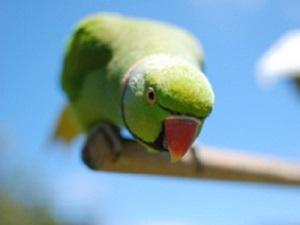Simon Tollington
Other projects
29 Nov 2011
The Analysis of Stable Isotopes to Determine the Value of Using Supplementary Feeding as a Conservation Management Tool
25 Jun 2014
Maximising the Conservation Value of Supplemental Feeding by Analysing Stable Isotopes to Determine the Seasonal Foraging Behaviour of Mauritius Parakeets
By using assays of immune function this project aims to select individuals from a small, historically bottlenecked population of endangered parakeets with which to create new viable populations.

Aurelie fitting rings to 'Piou-Piou'. © Lydie Héré.
Inbreeding and loss of genetic diversity are believed to reduce the ability of natural populations to cope with disease, presenting important implications for the conservation of small, bottlenecked populations. This project will use genetic and new immunocompetence techniques to identify immunologically competent individuals amongst the endangered Mauritius parakeet population that are least likely to succumb to the recently introduced Psittacine-Beak-and-Feather-Virus (PBFV) that now threatens this restored population. Blood samples will be taken from wild individuals caught in supplementary feeding stations and in existing nest boxes. These samples will be used to determine variation and level of circulating antibodies via a haemolysis-haemagglutination assay and will provide blood smears for differential blood cell counts.

Tahi.
In addition, the immune function of nestlings will be challenged via the injection of phytohaemagglutinin (PHA), a commonly used technique in studies of avian immune function. Genetic tests for the prevalence of PBFV will be carried out for all sampled individuals. This crucial work will ensure that future reintroduced populations of this endangered parrot destined for east Mauritius in 2011 have maximal immune function to ensure long-term population viability.
This project is supported by the National Parks and Conservation Service (NPCS) of Mauritius and the Mauritian Wildlife Foundation (MWF) and as such aims wherever possible to include and educate young Mauritian biologists thereby building in-situ technical knowledge. Ms Aurélie Chowrimootoo will be a paid research assistant for this project and will learn various techniques necessary for sample collection and processing along with bird handling skills.
The results of this work will offer a valuable contribution to current knowledge of avian ecological immunology, much of which is gleaned from laboratory studies involving captive birds and only single immunoassays used in isolation. In contrast, this research will use multiple tests of immune function in a wild population whilst being able to account for environmental and ecological parameters.
The implications of these findings will directly benefit future disease management studies, offering insight into why certain individuals are more prone to infection and how to mitigate the effects of future disease outbreak. This insight will serve as a critical management tool for future reintroduction programmes, which, with little moderation and optimisation, could be applied to species elsewhere, thereby vastly increasing the success rate of conservation programmes.